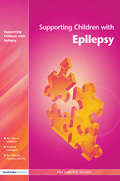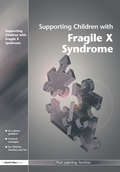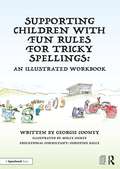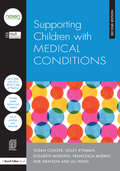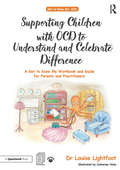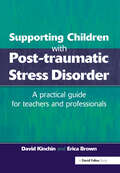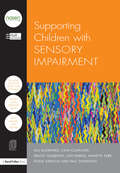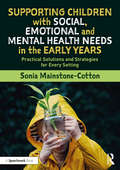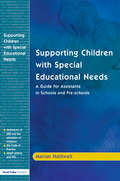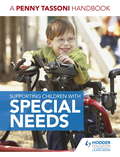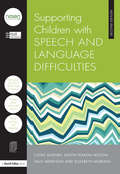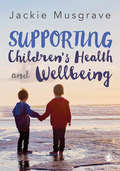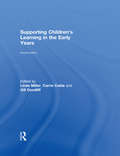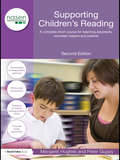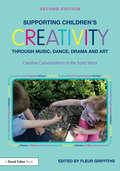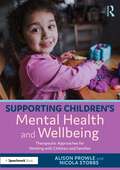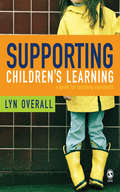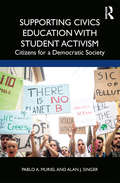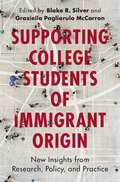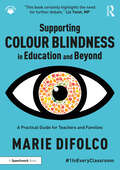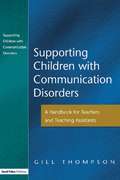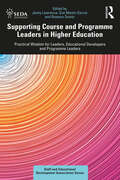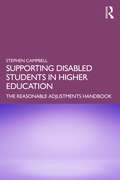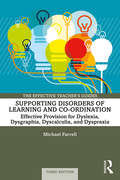- Table View
- List View
Supporting Children with Epilepsy
by Hull Learning ServicesOff-the-shelf support containing all the vital information practitioners need to know about Epilepsy, this book includes * Different types of seizures and what causes them * What to do when a person has a seizure * Advice on how to address school issues * Organizing out of school activities
Supporting Children with Fragile X Syndrome
by Hull Learning ServicesOff-the-shelf support containing all the vital information practitioners need to know about Fragile X Syndrome, this book includes: * Definition of Fragile X Syndrome and its educational implications * Ideas on how to improve access to the curriculum * Advice on how to manage support staff * Guidance on coordinating home and school liaison
Supporting Children with Fun Rules for Tricky Spellings: An Illustrated Workbook (Fun Rules for Tricky Spellings)
by Georgie CooneyThis illustrated workbook has been created to support learners who, after acquiring the basics of reading and writing, have struggled to organically grasp the rules that govern spelling in the English language. Each photocopiable worksheet is designed to support a key spelling rule, explored in the colourful storybook Who Put the Spell into Spelling? This activity workbook is designed to be used alongside the storybook. Key features include: Twenty-two activity worksheets designed to help learners understand and practise key spelling rules Activities designed to support skills in reading, spelling and writing Quirky illustrations designed to make the rules come to life Developed with feedback from teachers and students, this is an invaluable resource for teachers and parents looking to support learners who find spelling a challenge, or who are learning English as an additional language.
Supporting Children with Medical Conditions (nasen spotlight)
by Hull City CouncilThe fully revised new edition of Supporting Children with Medical Conditions provides teachers and practitioners with a reference to medical conditions most commonly found amongst school-aged children, including asthma, cerebral palsy, cystic fibrosis, eczema, epilepsy, head injuries, heart conditions, hydrocephalus and spina bifida. With up to date advice for practitioners, each condition is clearly described in terms of causes, symptoms and treatment, and the authors accessibly explain the educational implications – what teachers and support staff should be aware of, how they can minimise pupils’ difficulties in school and maximise access to the curriculum. With all the vital information practitioners will need to know about Medical Conditions, this book includes: Definitions of different Medical Conditions and their educational implications Guidelines for staff providing intimate personal care for pupils Suggestions to allow pupils to have full access to the curriculum Fully updated with the 2014 SEND Code of Practice and the guidance published in 2014 on ‘Supporting pupils at school with medical conditions’, this text will help professionals be more effective in supporting learners in a variety of settings. It also features useful checklists, templates and photocopiable resources.
Supporting Children with OCD to Understand and Celebrate Difference: A Get to Know Me Workbook and Guide for Parents and Practitioners (Get To Know Me)
by Louise LightfootThe ‘Get to Know Me’ resources aim to support children, with those around them, who may have additional/special educational needs. They are designed to empower the professionals and adults who support those with identified needs. Developed by child psychologist Dr Louise Lightfoot, the series includes activities specific to anxiety, depression and Obsessive Compulsive Disorder (OCD). In supporting the social and emotional health of students, it equips them with the ability to thrive, personally and academically. This book has been created for key adults (teachers, therapists and parents) as a complement to the picture book and draw along versions of Tidy Tim – a traditional narrative story exploring thoughts, feelings and sensations experienced by many children with OCD. The activities in this book offer practical tools and strategies to support the child and those around them in addition to the information specific to the condition to improve understanding of a child’s needs to promote empathy and acceptance. Picture book and draw along versions of Tidy Tim are available separately, and as part of the Get to Know Me: Obsessive Compulsive Disorder (OCD) set.
Supporting Children with Post Tramautic Stress Disorder: A Practical Guide for Teachers and Profesionals
by Erica Brown David KinchinIt is estimated that at any one time around 135,000 school children are suffering from post-traumatic stress disorder (PTSD). They may be survivors of abuse (physical, emotional or sexual) or bullying. Some may have been involved in a road accident, an accident at home or any other traumatic event. This book provides teachers, support staff and other educational professionals with the information they need to, really understand the implications of PTSD, ably and effectively support and educate a traumatized child, address questions such as what can cause PTSD in young people? and understand how PTSD might affect the education of children at school.
Supporting Children with Sensory Impairment (nasen spotlight)
by Hull City CouncilThis book provides a quick and easy reference guide to different types of sensory impairment, including causes, symptoms and the implications on teaching and learning. With most children and young people with hearing or visual impairments attending mainstream schools, this book explains the most effective and practical strategies for use in mainstream classrooms. Fully up to date with the 2014 SEND Code of Practice, this accessible resource is split into two sections: Supporting Children with a Hearing Impairment and Supporting Children with a Visual Impairment. The wide-ranging chapters include: Educational access for pupils with hearing loss Teaching phonics Teaching deaf pupils with English as a second language Identifying children with visual impairment Classroom management Adapting resources This practical text provides strategies to use in schools to ensure that children with sensory impairments are fully supported. Featuring useful checklist and photocopiable resouces, it contains a wealth of valuable advice and tried-and-tested strategies for teachers and support staff working in early years settings, schools, academies and colleges.
Supporting Children with Social, Emotional and Mental Health Needs in the Early Years: Practical Solutions and Strategies for Every Setting
by Sonia Mainstone-CottonThis accessible book offers essential guidance and practical ideas for Early Years staff to support children with social, emotional and mental health (SEMH) needs. It draws upon a wealth of experiences and insights to explore what SEMH is, why children may have SEMH needs, and what this can look like, giving practitioners the confidence they need to understand early signals and signs. Chapters share practical tools, activities and strategies, exploring topics that include: environment routines and transitions sensory experiences feelings and emotions the role of the adult. A range of case studies and resource suggestions are woven throughout, bringing the theory alive with first-hand advice from a variety of professionals, including educational psychologists, play therapists and Forest School specialists. This book is a refreshing and practical guide, and an essential read for all Early Years practitioners looking to cultivate a supportive and compassionate environment.
Supporting Children with Special Educational Needs: A Guide for Assistants in Schools and Pre-schools
by Marian HalliwellFirst Published in 2004. Routledge is an imprint of Taylor & Francis, an informa company.
Supporting Children with Special Needs: A Penny Tassoni Handbook
by Penny TassoniSupport the individual needs of children with this practical and informative guide from Penny TassoniFully matched to the new 2014 Special Education Needs and Disability Code of Practice, this Penny Tassoni Handbook explores supporting children with individual needs, working with parents and the issues surrounding SEN and disability. Tassoni's signature style and approach ensures that the government code is translated into a practical, informative and easy-to-read guide for anyone working in the role of a SENCO.- Helps you tailor your strategies in the key areas of communication & interaction, cognition & learning, social, emotional & mental health and sensory and/or physical needs.- Includes a detailed reference section on a wide range of specific needs from autism spectrum condition through to Fragile X.- Uses colourful design and illustrative photos which make theory easy to understand and to put into practice in real world scenarios.- Written in Penny Tassoni's easy-to-read, informative and practical style.
Supporting Children with Speech and Language Difficulties (nasen spotlight)
by Hull City CouncilCompletely revised and updated in light of the new SEND 2014 Code of Practice, this new edition describes the different types of difficulties experienced by pupils with speech, language and communication needs. It will help teachers and other professionals to feel more confident by providing expert guidance and practical strategies, and as a professional development tool, will also encourage outstanding practice by suggesting ideas and materials for in-house training sessions. The wide-ranging and accessible chapters explore topics including: Listening skills Phonological awareness Comprehension of language Activities for circle time Working with parents Featuring useful checklists, templates and photocopiable resources, this practical resource contains a wealth of valuable advice and tried-and-tested strategies for identifying children and young people with speech, language and communication needs, ensuring they have the support they need to make exceptional progress.
Supporting Children's Health and Wellbeing
by Jackie MusgraveIn the recent years 'safeguarding' measures to ensure the health and wellbeing of all children has become an increasing focus in the early years. Supporting Children's Health and Wellbeing helps early years students and practitioners working with children and young people gain an understanding of the key issues relating to children’s health in particular, examining the possible ways in which health can impact upon young children’s early childhood education and care. Packed full of practical advice for the everyday realities of the early years classroom, topics discussed include: Historical perspectives and contemporary issues related to child health Current policy and legislation How to support the child and the family Nutrition in childhood Infectious diseases, infestations and the acutely ill child Children with chronic and complex medical conditions Coping with the death of a child A timely, topical text that will be invaluable to early years professionals. Jackie Musgrave will be discussing key ideas from Supporting Children’s Health and Wellbeing in the SAGE Early Years Masterclass, a free professional development experience hosted by Kathy Brodie. To sign up, or for more information, click here.
Supporting Children's Learning in the Early Years
by Linda Miller Carrie Cable Gill GoodliffSupporting Children’s Learning in the Early Years is aimed at early years practitioners who are developing their knowledge and understanding of professional practice through studying at undergraduate level. The book encourages readers to consider their professional development as reflective practitioners, building on and supporting the government agenda to provide quality provision for young children and their families. Combining theory and practice, and bringing together current research and thinking in a broad range of areas, the book covers: Learning environments: young children as learners, assessment of learning, well being and children’s rights, diversity and inclusion. Learning and development: children’s development including social and emotional development, literacy and mathematical development, the potential of ICT, fostering creativity, musical development and knowledge and understanding of the world. Reflective practice: the learning environment, safeguarding and wellbeing, the reflective practitioner. Throughout, the contributions in this book encourage the reader to consider the diverse range of experiences which young children bring to early years and early primary settings and suggest ways in which they can be supported. The book will also be a valuable and unique resource for training providers of a range of courses at further and higher education level that prepare people to work with, and lead in, early years settings in the UK.
Supporting Children's Reading: A Complete Short Course for Teaching Assistants, Volunteer Helpers and Parents (nasen spotlight)
by Peter Guppy Margaret HughesBeing able to read is one of the most important skills in life and something we all want our children to achieve – for learning and for pleasure. Supporting Children’s Reading gives you the understanding you need of the reading process to ensure that children are effectively supported in their reading journeys. This practical programme draws on the authors’ wealth of experience in delivering this kind of training and is an invaluable point of reference for anyone working with children to improve their reading. With links to downloadable online resources, it provides everything you need to deliver a bespoke training course tailored to meet your particular audience, including: succinct and clear explanations of how reading works time-saving resources such as photocopiable handouts and professionally designed visual display screens advice on helping children to improve both their decoding and comprehension skills guidance on strategies for helping a child deal with a problem word. Supporting Children’s Reading is an accessible, ready-to-use resource to support teachers working with teaching assistants, volunteer ‘Reading Buddies’ and parents, to provide training on how to share books and listen to readers effectively. It will be especially useful for adults working with children who, for whatever reason, need extra support in developing reading skills.
Supporting Children’s Creativity through Music, Dance, Drama and Art: Creative Conversations in the Early Years
by Fleur GriffithsAn essential part of children’s development in the early years involves creative engagement through language, gestures, body movements, drawing, music, and creating shared meanings in playful contexts. Supporting Children’s Creativity through Music, Dance, Drama and Art brings together contributions from a range of early years practitioners and professionals, sharing their ‘creative conversations’ and helping readers to implement the themes of the Early Years Foundation Stage framework in a creative way. Including a new chapter to explore the relationships between music and movement, this second edition has been fully updated and covers: How to incorporate music-making and storytelling in the classroom How to use stories of practice to inspire reflection and change How to extend, challenge and sustain children’s interests How to make use of the ‘Talking Table’ and ‘Helicopter’ approaches How to become an effective play-partner How to improve practice with interactive strategies and music for well-being How to use observation to inspire planning and learning projects. Appealing to all with an interest in early years practice, this new edition demonstrates how parents, carers and practitioners can put excitement and inspiration back into the learning process, guiding them to encourage and support the creative capacities of young children.
Supporting Children’s Mental Health and Wellbeing: Therapeutic Approaches for Working with Children and Families
by Nicola Stobbs Alison ProwleThis key text recognises the importance of upskilling students and practitioners to understand children’s holistic needs and to develop new ways of working therapeutically that support their wellbeing and resilience.The book outlines why therapeutic approaches are necessary, considers the range of approaches that are available and the evidence behind them and shows how these can be used to support children and families in an increasingly challenging practice landscape. Placing an emphasis on self-care, it celebrates the role of the practitioner as an inspirer of hope and architect of resilience and self-efficacy. Each chapter in the book: Provides an overview of adversity, trauma and holistic wellbeing Includes helpful case studies and practical examples, alongside reflective questions that can be used as discussion points in seminars Takes a multi-disciplinary approach with contributions from specialists working directly with children and families across a range of settings Equips students and practitioners with a wide range of models, tools and approaches to achieve their best outcomes Offers advice for developing a therapeutic relationship, and the skills and dispositions needed for practice. This informative and practical book will be essential reading for students in a range of disciplines, including early years professional practice and early childhood degrees, as well as education, health, social care and community services. It will also be a valuable resource for early years and primary practitioners, trauma-informed schools and organisations supporting children and families.
Supporting Children′s Health and Wellbeing
by Jackie MusgraveIn the recent years ′safeguarding′ measures to ensure the health and wellbeing of all children has become an increasing focus in the early years. Supporting Children′s Health and Wellbeing helps early years students and practitioners working with children and young people gain an understanding of the key issues relating to children’s health in particular, examining the possible ways in which health can impact upon young children’s early childhood education and care. Packed full of practical advice for the everyday realities of the early years classroom, topics discussed include: Historical perspectives and contemporary issues related to child health Current policy and legislation How to support the child and the family Nutrition in childhood Infectious diseases, infestations and the acutely ill child Children with chronic and complex medical conditions Coping with the death of a child A timely, topical text that will be invaluable to early years professionals. Jackie Musgrave will be discussing key ideas from Supporting Children’s Health and Wellbeing in the SAGE Early Years Masterclass, a free professional development experience hosted by Kathy Brodie.
Supporting Children′s Learning: A Guide for Teaching Assistants
by Lyn OverallAre you looking for a book that explains all the key ideas on how children learn, and how to best support children in that learning? Covering all the major themes, this book offers: o An introduction to the main theories of learning and development, from birth to primary; o A chapter on brain development; o An introduction to what motivates learners to learn, and how much learners understand about how learning takes place; o A glossary of key terms; o Case studies, research summaries, tasks for reflection, chapter summaries and advice on further reading. This book will be essential reading for Teaching Assistants studying for Foundation Degrees, or for the Higher Level Teaching Assistant qualification. Students on any course looking at how children learn (such as Early Childhood and teacher training courses) will likewise find this book covers all the key themes. Lyn Overall is Principal Lecturer at Sheffield Hallam University.
Supporting Civics Education with Student Activism: Citizens for a Democratic Society
by Alan J. Singer Pablo A. MurielThis book empowers teachers to support student activists. The authors examine arguments for promoting student activism, explore state and national curriculum standards, suggest activist projects, and report examples of student individual and group activism. By offering suggestions for engaging students as activists across the K-12 curriculum and by including the stories of student activists who became lifetime activists, the book demonstrates how activism can serve to bolster democracy and be a component of rich, experiential learning. Including interviews with student and teacher activists, this volume highlights issues such as racial and immigrant justice, anti-gun violence, and climate change.
Supporting College Students of Immigrant Origin: New Insights from Research, Policy, and Practice
by Blake R. Silver Graziella Pagliarulo MccarronOver 5 million college students in the United States – nearly one-in-three students currently enrolled – are of immigrant origin, meaning they are either the children of immigrant parents or guardians and/or immigrants themselves. These students accounted for almost 60% of the growth in higher education enrolment in the 21st century. Nevertheless, there is very little research dedicated to this student population's specific experiences of postsecondary education, with similar absences discernible within the realms of higher education policy and practice. Although college campuses are making important progress in building more inclusive spaces, conversations about climate and student care rarely account for the journeys of students of immigrant origin. Featuring 20 chapters written by more than 50 contributors, this book addresses this glaring omission. The authors examine how students of immigrant origin experience the road to, through, and beyond higher education, while, simultaneously, speaking to evidence-based implications for policy, research, and practice.
Supporting Colour Blindness in Education and Beyond: A Practical Guide for Teachers and Families
by Marie DifolcoWould you be surprised to know, one child in every average class of thirty is Colour Blind?Colour Blindness can be a barrier to learning across the whole curriculum, yet most schools cannot identify all their Colour Blind children, and practitioners often cannot recall teaching a child with it.This essential guide explores Colour Blindness, an often-unrecognised special educational need and disability (SEND). It gives you the tools and confidence to ensure children with Colour Blindness can reach their full potential. It helps you to understand what the condition is so you can easily make your teaching accessible and inclusive to all Colour Blind children, undiagnosed or not. The book:• Offers detailed and practical guidance for identifying Colour Blindness and catering for it from early years through to higher education and beyond.• Focuses on simple and easy-to-implement strategies to ensure Colour Blind children are not disadvantaged, dispelling myths and misguidance along the way.• Discusses how educators and parents can work together to raise the child’s self-esteem, seeking solutions and interventions that do not single them out, or in fact remove colour as a useful tool for those that see it normally.This accessible book is vital reading for SENDCos, teachers and classroom assistants, from nursery through to upper secondary, as well as the parents and carers of Colour Blind children.
Supporting Communication Disorders: A Handbook for Teachers and Teaching Assistants
by Gill ThompsonThis practical handbook provides SENCOs, class teachers and teaching assistants with a step-by-step guide to the identification of speech and language disorders, a basic knowledge of the underlying causes and guidance for developing strategies for support and intervention in the classroom. It gives a foundation for assessment and differentiation, which will help the teacher or teaching assistant to work effectively in collaboration with speech and language therapists. It suggests appropriate materials and programmes of work for enabling the child to access the curriculum as fully as possible. The book includes photocopiable assessments and worksheets, which can be used as part of planning and intervention for individual children or small group work.
Supporting Course and Programme Leaders in Higher Education: Practical Wisdom for Leaders, Educational Developers and Programme Leaders (SEDA Series)
by Jenny LawrenceOffering research- and evidence-based approaches that explore the essential components of programme leadership in higher education, this book is designed to define, develop and support the programme leadership role and all those who undertake it. The book is split into three parts, taking into account the three different lenses through which programme leaders and their professional practice and relationships are generally viewed: the institution, the individual and the programme team. Chapters and case studies address key elements crucial to the holistic development of programme leadership and programme leaders. These include: Understanding and developing programme leadership in context Developing organisational structures and processes so programme leaders can thrive Growing programme leaders’ educational leadership, team working and communication Crucial reading for programme leaders, as well as academic and educational developers and leaders working across faculties and whole institutions, this text includes contributions from teaching- and research-focused higher education institutions, as well as established and modern college- and university-based providers in both the northern and southern hemispheres.
Supporting Disabled Students in Higher Education: The Reasonable Adjustments Handbook
by Stephen CampbellSupporting Disabled Students in Higher Education is a practical and inclusive handbook designed to ensure disabled students are supported in their journey through mainstream higher education. Informed by case studies, this essential guide highlights how this can be achieved through the adoption of practical, reasonable adjustments. Coupled with recommendations for best practice across higher education, this book outlines experiences and barriers to inclusion and provides detailed guidance for inclusive practices including adjustments to accommodation, accessing physical and virtual learning spaces, teaching activities, developing the curriculum and assessment. Written by an experienced dyslexia and disability coordinator within higher education, chapters encourage readers to develop a greater understanding of the impact that disabilities may have on students’ academic progress. Areas explored include: Specific learning difficulties (SpLD) Mental health conditions Visually impaired and blind students Deaf and hearing-impaired students Physical impairments Long-term medical conditions This book lays out the step-by-step process to enable effective communication between disability staff, academic staff and students and is a crucial guide for anyone with an interest in promoting and facilitating accessibility, inclusion and widening participation in higher education.
Supporting Disorders of Learning and Co-ordination: Effective Provision for Dyslexia, Dysgraphia, Dyscalculia, and Dyspraxia (The Effective Teacher's Guides)
by Michael FarrellThis revised and updated third edition, previously titled The Effective Teacher's Guide to Dyslexia and Other Learning Difficulties (Learning Disabilities), unravels the complexity of specific learning difficulties in an accessible and user-friendly way. Each chapter provides key information about the disorder in question, giving a clear definition before discussing prevalence, causal factors, identification, and assessment and provision. Implications for the curriculum and related assessment, pedagogy, resources, therapy/care, and school and classroom organisation are explained, allowing providers to reflect and adapt their practice in response to the needs of the individual. The book informs effective provision, with the aim of encouraging the best achievement and personal and social development for children and young people. The book authoritatively and lucidly addresses issues associated with • impairment in reading/dyslexia, • impairment in written expression/dysgraphia, • impairment in mathematics/dyscalculia, and • developmental co-ordination disorder/dyspraxia. Recognising the importance and the challenge of multi-professional working, the book relates provision to the roles of parents and carers alongside that of the practitioner. Underpinned by research and widely held professional judgement, this will prove a practical, readable, and inspiring resource for professionals in the UK, US, and elsewhere including teachers, therapists, psychologists, and students entering these professions.
